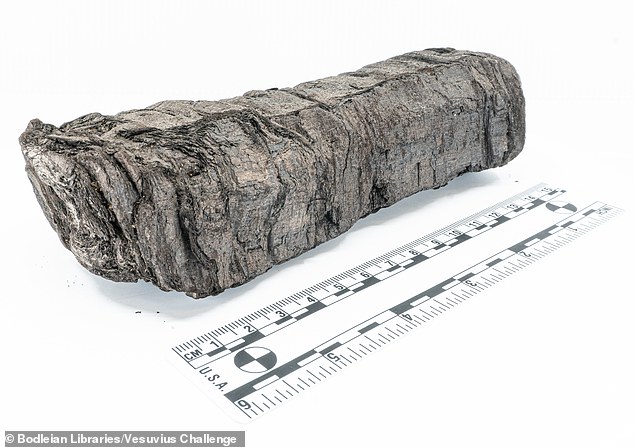Few objects pique the curiosity of academics quite like the Herculaneum scrolls – the ancient documents buried by the eruption of Mount Vesuvius in AD 79.
These priceless rolled-up documents carry ancient text written in carbon-based ink on papyrus – a material similar to paper made from the pith of the papyrus plant.
Now, for the first time, researchers have found the title and author inside one of the scrolls known as PHerc. 172, housed at Bodleian Libraries in Oxford.
With the help of AI, it has been identified as ‘On Vices’ by the Greek philosopher Philodemus, a historic ethical treatise providing guidance for ‘cultivating a virtuous life’.
In recognition of this achievement, researchers have been awarded the Vesuvius Challenge First Title Prize, which includes prize money of $60,000/£45,000.
Bodley’s Librarian Richard Ovenden said: ‘Finding the full title of a work inside a scroll that has been unread for two millennia is an astonishing achievement.
‘[It] illustrates the huge potential for AI to transform arts and humanities scholarship, our understanding of the past, and breathes new life into ancient artefacts.’
‘On Vices’ – or to give it its full name ‘On Vices and Their Opposite Virtues and In Whom They Are and About What’ – is already known about, but this particular text may a volume of ‘On Vices’ which no-one has accessed since the eruption.

Scientists have virtually unfurled PHerc. 172, one of three Herculaneum scrolls now housed at the Bodleian Libraries in Oxford (pictured)

While the first images of the inside of the scroll were published in February 2025, experts have now discovered the title page within the innermost part of the scroll – ‘Φ Ι Λ Ο̣ Δ Η Μ Ο̣ Υ̣ Π Ε̣ Ρ Ι Κ Α̣ Κ̣ Ι Ⲱ Ν A or Philodemos On Vices
Almost destroyed by Mount Vesuvius, the Herculaneum scrolls are thought to contain profound philosophical and literary texts from ancient Greek and Roman scholars.
The problem is that any attempts to unroll the burnt cylinders will turn them to dust because they are so fragile – meaning the words would be lost forever.
So, scientists have been turning to ingenious methods such as x-ray scanning, ink-detection software and AI to virtually ‘unroll’ them.
Following the scanning of scroll PHerc. 172 in July 2024 at the Diamond Light Source in Harwell, Oxfordshire, data was released publicly.
Vesuvius Challenge – which is the organisation behind the initiative – invited researchers worldwide to contribute to deciphering the text.
The first images of the inside of scroll PHerc. 172 had were publishe, revealing fascinating fragments of Greek text.
But the title page was at the very centre it was considerably harder to read – requiring considerable analysis before it could be accurately interpreted.
This was independently achieved by two parties at roughly the same time – by Sean Johnson from the Vesuvius Challenge, and contestant research team Marcel Roth and Micha Nowak from the University of Würzburg, Germany.


These ancient rolls of papyrus are thought to contain profound philosophical and literary texts from ancient Greek and Roman scholars

In 1802 or 1803, PHerc. 172 and other scrolls were given by the king of Naples and Sicily, Ferdinand IV, to the future George IV in England

Even if scientists were able to physically unfurl the scroll, ink markings would be invisible to the naked human eye due to the burnt papyrus
The pair have been awarded the first Vesuvius Challenge First Title Prize, in recognition of their work, which has independently reviewed and verified by the Vesuvius Challenge papyrological team.
‘The simultaneous reproduction of the title image from multiple sources, along with independent scholarly review, provides a high degree of confidence in the reading,’ Bodleian Libraries said in a statement.
Author of ‘On Vices’, Philodemus (c. 110-30 BC), was an philosopher and poet from Gadara, an ancient Hellenistic city in what is now Jordan.
His ethical teachings emphasised the pursuit of pleasure as central to a good life, while arguing against rigid logic and formal rhetoric.
Belonging to the an Epicurean school of thought, Philodemus believed philosophy should serve practical human happiness rather than abstract intellectual debate.
His works make up the majority of the library in the Villa of Papyri at Herculaneum were the famous scrolls were buried, so it is unsurprising that he was the author of this work too, experts say.
Whilst the scroll’s author and title are now clear, where the text sits within the On Vices series, known by scholars to be at least 10 books long, is still open to interpretation.
The book number in the title image can be read as an alpha, indicating that this scroll is ‘Book 1’, but it could also be ‘delta’, suggesting Book 4.

Hundreds of the scrolls – scorched in the eruption of Mount Vesuvius – were destroyed during early attempts to unroll them
Other books from the On Vices are known from the Herculaneum papyri that were physically unrolled.
The best known are On Property Management (Book 9) and On Arrogance (Book 10), but there are others too, so there is still much to learn.
Michael McOsker, a researcher in Papyrology at University College London, called the latest discovery ‘a very exciting development’.
‘[We have] a great opportunity to learn more about Philodemus’ ethical views and to get a better view of the On Vices as a whole, especially if it turns out to be the first book,’ he said.
‘It’s great that progress continues apace and we’ll soon be able to read these rolls in their entireties.’
This article was originally published by a www.dailymail.co.uk . Read the Original article here. .


